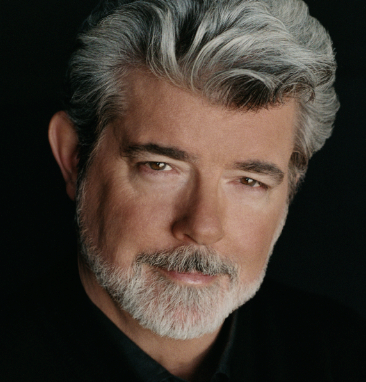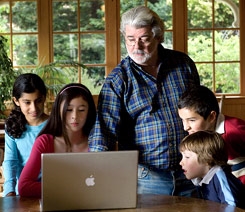 |
| George Lucas (Edutopia ()) |
When most Americans consider the achievements of George Lucas, they tend to focus on his cinematic breakthroughs. Few realize that he has had an arguably greater impact on the world through his leadership in the field of education. For the past 20 years, Mr. Lucas's Educational Foundation has sought out the best in educational innovations and put those tools in the hands of teachers around the world.
In the U.S. alone, the cutting edge projects being championed by Mr. Lucas's Edutopia illustrate the power of his hands-on approach to curriculum design. Fifth-grade students at the Ferryway school in Malden, Massachusetts, learn about history, science and engineering by designing their own waterwheels. When they later visit the Saugus Iron Works Company, they have already tested their own technology that mirrors the plant's. A young girl at the West Hawaii Explorations Academy measures the pH balance of water samples, in an effort to restore the island's ancient ponds. A teacher in Waldport, Oregon, implements a series of lesson plans designed to improve her students' emotional intelligence and dubs the improvements in classroom behavior "miraculous." Students at High Tech High create a series of field guides about the San Diego Bay, by working with an interconnected team of the school's biology, math and humanities teachers. These disparate successes from across the country share one thing in common: the support of The George Lucas Educational Foundation.
Before realizing these great achievements, Mr. Lucas began his professional life as student himself at the University of Southern California's School of Cinematic Arts. He expanded his USC student film THX 1138 into a well-received feature film and cemented his status as a major Hollywood director with the hit film American Graffiti. In 1977 Lucas launched one of the most successful film franchises in history with Star Wars. When not working on the Star Wars films, he has had success as a screenwriter (creating the Indiana Jones story) and the founder of Lucasfilm, one of the world's leading film and entertainment companies.
Yet Lucas's interest in the field of education never wavered. In 1991 he used the capital he had amassed through his filmmaking to create The George Lucas Educational Foundation with the goal of fostering innovation in schools. The foundation's findings are made available to the public through Edutopia.org's incredible online resources. Currently celebrating its 20th anniversary, Edutopia has grown into an indelible resource for passionate educators, where innovative lesson plans and compelling stories of educational projects are constantly shared. In addition to the perennial goals of improving teacher development and assessment methods, the organization has adopted several progressive themes that reflect Mr. Lucas's hopes for a new and better approach to global education.
 |
| George Lucas works with students (Edutopia ()) |
Lucas describes his own experiences of being educated in public schools as "quite frustrating, [only] occasionally, I had a teacher who engaged my curiosity and motivated me to learn. I wondered, why can't school be engaging all of the time?" This is one of the reasons why he is a great proponent of project-based learning, where students learn core subject matter and critical skills through meaningful activities that examine complex, real-world issues. A recent example from Edutopia's publications is a program for San Francisco high school students in which the students learned about math, engineering, design and communication skills by formulating and presenting architectural plans for the city's newly redesigned Pier 14. Their work was critiqued by a professional urban designer working for the city, and his feedback motivated the students to rethink their design and push forward with an even better effort.
Lucas's organization hopes to encourage similar projects in schools, so that students can not only learn core subject matter and crucial skills but also engage in assignments that they genuinely want to accomplish. "The primary driving force for young people is curiosity," says Lucas. "They naturally wonder how things work. And the other one is that they want to be adults. So, you give them adult projects like building a house, building a rocket ship, running a newspaper. You've got to give them an actual goal, and it has to be a goal they enjoy. Kids love to create things, and they'll learn if you let them create."
In addition to designing curricula that inspires student achievement, Edutopia is committed to providing students with the tools and skills they will need to excel in the modern world. As with his cutting edge approach to cinema, Lucas has an expansive vision of where education should develop in the future. "I think English…should be renamed communication," he notes in a recent interview. He feels that it should go beyond English language to include music, cinema, web design, etc. In essence, all the modern arts of persuasion should be encompassed, better preparing students for the skill sets they will actually need in the 21st century. Along these lines, Edutopia works to give students access to new technologies, as well as the training that they and their teachers need to utilize these important tools.
Lucas's vision also stresses the importance of social and emotional learning. According to Edutopia's research, emotionally intelligent students abilities to "empathize, persevere, control impulses, communicate clearly, make thoughtful decisions, solve problems, and work with others earns them friends and success." Whether through programs that help students resolve their conflicts peacefully or curricula designed to improve communication skills, Edutopia has consistently held that a good education should be about more than just improving test scores. As Mr. Lucas notes himself, "in my work in filmmaking, we need talented individuals with technical skills, but their abilities to communicate and work with others are just as valuable." He hopes that teachers will not simply teach intellectual concepts, but also model positive, ethical behavior for their students.
In his appreciation of character-based education and the importance of the arts, Mr. Lucas's views fluidly reflect those of The MY HERO Project. MY HERO is proud to honor Mr. Lucas for his commitment to improving education. While his films have provided the world with fictional heroes that light the imaginations of young and old alike, it is Mr. Lucas's commitment to improving the quality of education for children worldwide that makes him a worthy hero in his own right.
Page created on 12/13/2011 9:23:58 PM
Last edited 2/10/2022 1:15:01 PM
